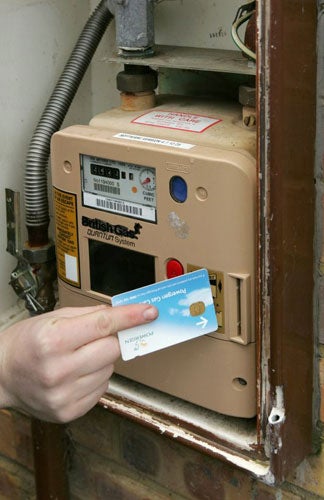Energy giants 'prey' on poor forced to use pre-pay meters

Your support helps us to tell the story
From reproductive rights to climate change to Big Tech, The Independent is on the ground when the story is developing. Whether it's investigating the financials of Elon Musk's pro-Trump PAC or producing our latest documentary, 'The A Word', which shines a light on the American women fighting for reproductive rights, we know how important it is to parse out the facts from the messaging.
At such a critical moment in US history, we need reporters on the ground. Your donation allows us to keep sending journalists to speak to both sides of the story.
The Independent is trusted by Americans across the entire political spectrum. And unlike many other quality news outlets, we choose not to lock Americans out of our reporting and analysis with paywalls. We believe quality journalism should be available to everyone, paid for by those who can afford it.
Your support makes all the difference.Energy companies are charging people on pre-payments up to £567 a year more than wealthier customers on internet tariffs, a government-funded consumer group has found.
In the last report before its abolition, Energywatch accused the energy firms of "preying" on poor customers who could not move to cheaper tariffs because of debt problems.
Poorer customers buy credits for their electricity and gas supply to load into the meters rather than pay monthly or quarterly. But the big six energy companies charge them far more than other customers. In January, The Independent disclosed that customers with pre-payment meters are charged 10 times more than the energy companies pay back to vulnerable customers on little-publicised "social tariff" schemes.
One million of the five million pre-payment customers are classed as being in fuel poverty by Ofgem, the electricity regulator.
In an investigation, the consumer group Energywatch found that British Gas – biggest of the big six energy companies and the one which spends the most on its social tariff – charged pre-payment customers the most of all its rivals, £567 more than its cheapest deal.
The disparity was next greatest at the German-owned firm E.on, which charged pre-payment clients £411 more than those on its cheapest deal, followed by Npower £378, ScottishPower £172, and Scottish and Southern £167. EDF has no equivalent tariff.
Allan Asher, Energywatch's chief executive, said: "Energy suppliers are preying on their poorest customers with discriminatory tariffs that squeeze extra revenue out pre-payment meter-users, which includes many of those least able to afford to pay their energy bills and least able to switch."
The Energy Retail Association said pre-payment meters offered customers flexibility and the ability to budget, and most were in rented homes, holiday lets and student accommodation. "According to Ofgem figures, just 20 per cent are used by the fuel poor," the trade body said in a statement. "Therefore equalising all tariffs would mean that those in fuel poverty who do not pay this way would subsidise the small percentage who are."
Publication of the "poor pay more" league table comes a day after the Local Government Association disclosed that the big six paid their shareholders an extra £257m in dividends last year despite claims that high profits were needed for re-investment in energy infrastructure. Independent experts commissioned by the LGA found that dividend payments rose from £1.378bn in 2006 to £1.635bn in 2007, a 19 per cent increase, or £75 per household.
Gordon Brown has ruled out fuel vouchers to help people pay rising fuel bills, up by 40 per cent this year.
Energywatch is being absorbed into the Government's new consumer body, Consumer Focus.
Join our commenting forum
Join thought-provoking conversations, follow other Independent readers and see their replies
Comments